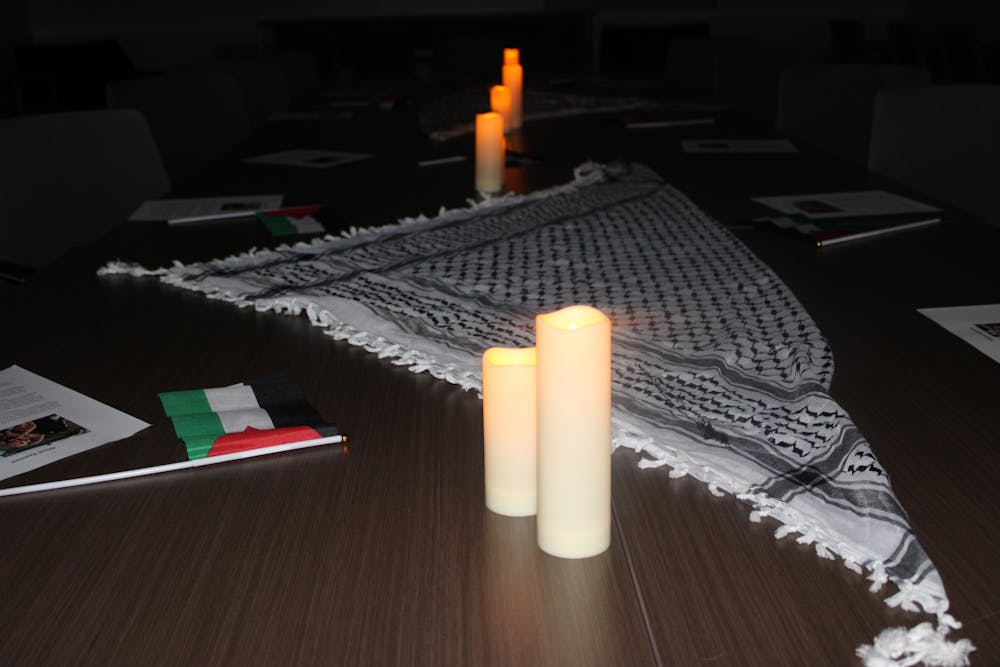Thursday night, Newcomb Hall’s Commonwealth Room was transformed into an immersive walk-through exhibit — “Shattered Lands, Unbroken Spirits” — that explored some of the many current humanitarian crises around the world. According to the Muslim Students Association, who hosted the event in collaboration with Students for Justice in Palestine and the Arab Student Organization, the event was designed to bring attention to global suffering that is often left on the periphery of campus conversations.
This year’s spotlight featured six stations, three of which focused on larger concepts of interconnected struggles — such as displacement, identity loss and scarcity of resources — while three were region-specific, centered on Palestine, Yemen and Syria. Additionally, a memorial wall honored victims of displacement and oppression and humanized the statistics by sharing their harrowing narratives from their perspectives. Another room had video stations that immersed visitors in the representational sounds of war.
Ibrahim Ahmed, MSA president and fourth-year College student, said that the intent of the event was not to politicize, but rather to humanize the lived experiences of victims behind the headlines that are often seen on the news. For him, raising awareness on Grounds for these issues is a crucial responsibility that University students hold.
“The whole entire point of this spotlight event is to give everyone a summary of what’s happening and how they can help … and [to show that] there are things that we can do to help out in whatever ways we can,” Ahmed said.
The event was formatted like a museum, displaying statistics, historical timelines, emotional personal narratives of victims and visuals of war-torn areas to evoke the lived realities of those affected by war and displacement. The exhibit, designed as a 15-20 minute walkthrough, was structured so that participants could engage sufficiently without it being a significant time commitment.
The first station, “Voided Identity,” symbolically marked each visitor with a number sticker — a reflection of how people experiencing these crises are often stripped of their individuality and reduced to just a number.
“[The purpose of] it is to immerse people into what they are about to get into, to set the stage,” Ahmed said. “It puts them in a place where they’re able to feel a little bit more.”
At another station, “Syria Detained,” visitors learned about the Saydnaya Prison — a facility so brutal it has been referred to as a “human slaughterhouse” by human rights organizations such as Amnesty International. Students speaking at the station not only shared disturbing statistics about the prison but also included narratives of victims. One such story was about a boy born inside of the prison who had never seen a tree or a bird.
Second-year Commerce student Marwa Ahsan, who returned this year to help with one of the stations after volunteering at last year’s event, said the emotional reactions of visitors continued to fuel her passion for this work.
“I saw the looks on peoples faces when they heard these emotional scenarios,” Ahsan said. “I really wanted to continue helping out with [the spotlight] because seeing their reaction made me realize how important these kinds of showcases are.”
The exhibit’s tone was somber and respectful — visitors were encouraged to put away their phones, walk silently and write reflections at the end. Throughout, interactive stations deepened the experience. One such stations asked participants to carry heavy bags across the room, stimulating the burden of displacement, while another handed out fake ration cards with limited funds, prompting difficult choices between items such as tuna or bread to reflect food insecurity.
For Ahmed, the spotlight is more than just an event — it is a platform for student activism and a call for awareness rooted in empathy.
“I think the raising awareness aspect is something that everyone should be doing,” Ahmed said. “If you don’t have the financial means of helping somebody, that doesn’t mean that somebody else doesn’t… you reaching out to other people who may be able to help is also a means of helping.”
Non-Muslim students and community members were encouraged to attend, and many did. According to Ahmed, the exhibit served as an eye-opener into the many crises around the world. For its organizers, it reaffirmed the power of student activism — rooted not only in information, but in emotion, empathy and the courage to raise one's voice.
“My parents [were] very against me speaking up for anything, even just stating an opinion [because] as a Muslim, they’re just scared,” Ahsan said. “But I realized how important raising your voice is and the impact that voice has.”
Launched in the spring of 2024 by MSA as a response to what experts have called a humanitarian crisis in Gaza, “Shattered Lands, Unbroken Spirits” has since expanded to highlight other global crises including the war in Syria, the famine in Yemen and the plight of Uyghur Muslims in China.
As Ahmed prepares to graduate, he hopes to see the event expand — both on Grounds and nationally. He also envisions it becoming an ongoing exhibition that is accessible to all community members, extending its impact beyond a single moment or audience.
“One thing I had in mind was expanding this event throughout this University, making it a lot bigger… something that’s on a poster, and it can kind of be like a museum,” Ahmed said.
In a time when global suffering often feels distant or abstract, Ahmed said this humanitarian spotlight proved that students can help in any way that is accessible to them — even if that simply means learning about these issues and informing others about them.







